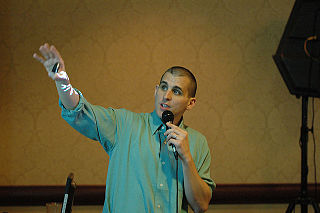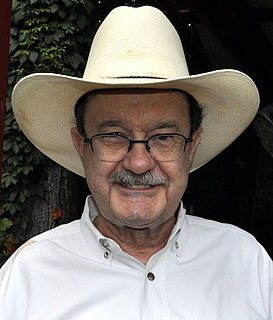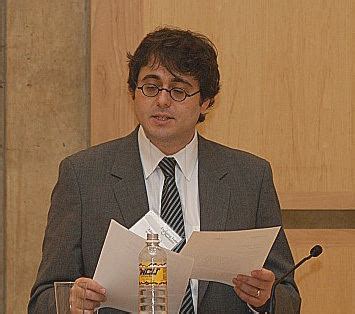A Quote by Don DeLillo
America is the world's living myth. There's no sense of wrong when you kill an American or blame America for some local disaster. This is our function, to be character types, to embody recurring themes that people can use to comfort themselves, justify themselves and so on. We're here to accommodate. Whatever people need, we provide. A myth is a useful thing.
Related Quotes
But the myth of power is, of course, a very powerful myth, and probably most people in this world more or less believe in it. It is a myth, which, if everybody believes in it, becomes to that extent self-validating. But it is still epistemological lunacy and leads inevitably to various sorts of disaster.
The reason I wouldn't dare to write a Western is simply because that seems to be so much a part of American culture. Maybe if I want to write a Western enough I should try to overcome that fear, but I'll certainly feel like I'm trespassing. I feel that that is so much a part of American foundation myth, it's part of the myth of America, the American vision of what America is, which people have glorified and then challenged and then vilified.
It helps to regard soul as an active intelligence, forming and plotting each person's fate. Translators use "plot" to render the ancient Greek word mythos in English. The plots that entangle our souls and draw forth our characters are the great myths. That is why we need a sense of myth and knowledge of different myths to gain insight into our epic struggles, our misalliances, and our tragedies. Myths show the imaginative structures inside our messes, and our human characters can locate themselves against the background of the characters of myth.
People who truly have control over time always have some in their pocket to give to someone in need. A sense of priorities drives their use of time and it can shift away from the ordinary work that’s easy to justify, in favor of the more ethereal, deeper things that are harder to justify. They protect their time from trivia and idiocy; these people are time rich. They provide themselves with a surplus of time. They might seem to idle, or relax more often than the rest, but that just might be a sign of their mastery, not their incompetence.
Mythology is the study of whatever religious or heroic legends are so foreign to a student's experience that he cannot believe them to be true. . . . Myth has two main functions. The first is to answer the sort of awkward questions that children ask, such as: 'Who made the world? How will it end? Who was the first man? Where do souls go after death?'. . . . The second function of myth is to justify an existing social system and account for traditional rites and customs.
Most people have a sense that things have gone terribly wrong. It's not just some giveaways to the rich and the rigging of regulatory rules. It's something fundamental. The very idea of America is being stolen, and people are sensing that with a tremor within their hearts. They are taking away this core notion of the common good, this idea that we are all in it together. They are diverting America from our historic striving towards egalitarianism, which is why America exists. It's the thing that makes us unique in history. That's what people are sensing. We are going down the wrong path.
Myth was regarded as primary; it was concerned with what was thought to be timeless and constant in our existence. Myth looked back to the origins of life, to the foundations of culture, and to the deepest levels of the human mind. Myth was not concerned with practical matters, but with meaning. Unless we find some significance in our lives, we mortal men and women fall very easily into despair. The mythos of a society provided people with a context that made sense of their day-to-day lives; it directed their attention to the eternal and the universal.
I believe in an America that is on the march - an America respected by all nations, friends and foes alike - an America that is moving, doing, working, trying - a strong America in a world
of peace. That peace must be based on world law and world order, on the mutual respect of all nations for the rights and powers of others and on a world economy in which no nation lacks the
ability to provide a decent standard of living for all of its people.
But myth is something else than an explanation of the world, of history, and of destiny. Myth expresses in terms of the world - that is, of the other world or the second world - the understanding that man has of himself in relation to the foundation and the limit of his existence. Hence to demythologize is to interpret myth, that is, to relate the objective representations of the myth to the self-understanding which is both shown and concealed in it.
What we did in the 1960s and early 1970s was raise the consciousness of white America that this government has a responsibility to Indian people. That there are treaties; that textbooks in every school in America have a responsibility to tell the truth. An awareness reached across America that if Native American people had to resort to arms at Wounded Knee, there must really be something wrong. And Americans realized that native people are still here, that they have a moral standing, a legal standing. From that, our own people began to sense the pride.
In America, you are not required to offer food to the hungry or shelter the homeless. There is no ordinance forcing you to visit the lonely, or comfort the infirmed. No where in the Constitution does it say you have to provide clothing to the poor. In fact, one of the nicest things about living here in America, is that you really don't have to do anything for anybody. But when you do, you give meaning and provide soul to the concept of community...and develop a sense of purpose to something greater than one's self.







































